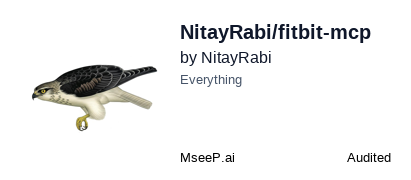FitBit MCP
A Model Context Protocol (MCP) implementation for Fitbit, enabling AI assistants to access and analyze your Fitbit health and fitness data. Disclaimer: This is an unofficial integration built using Fitbit's public API and is not affiliated with or endorsed by Fitbit Inc.
README
Fitbit MCP (Model Context Protocol)
Disclaimer: This is an unofficial integration built using Fitbit's public API and is not affiliated with or endorsed by Fitbit Inc.
A Model Context Protocol (MCP) implementation for Fitbit, enabling AI assistants to access and analyze your Fitbit health and fitness data.
Usage
For JSON configuration (for use with AI assistant frameworks):
{
"command": "npx",
"args": ["-y", "fitbit-mcp", "--stdio"],
"env": {
"FITBIT_ACCESS_TOKEN": "YOUR_FITBIT_ACCESS_TOKEN"
}
}
Or with arguments instead of environment variables:
{
"command": "npx",
"args": ["-y", "fitbit-mcp", "--stdio", "--fitbit-token=YOUR_FITBIT_ACCESS_TOKEN"]
}
Available Tools
This MCP provides the following tools for AI assistants to access your Fitbit data:
- getUserProfile: Get your Fitbit profile information
- getActivities: Get activity data for a specified date
- getSleepLogs: Get sleep data for a specified date
- getHeartRate: Get heart rate data for a specified date and period
- getSteps: Get step count for a specified date and period
- getBodyMeasurements: Get weight and body fat data
- getFoodLogs: Get food log data for a specified date
- getWaterLogs: Get water consumption data for a specified date
- getLifetimeStats: Get lifetime activity statistics
- getUserSettings: Get user settings and preferences
- getFloorsClimbed: Get floors climbed data
- getDistance: Get distance data
- getCalories: Get calories burned data
- getActiveZoneMinutes: Get active zone minutes data
- getDevices: Get information about connected Fitbit devices
- getBadges: Get earned badges and achievements
Most tools accept optional parameters:
date: Date in YYYY-MM-DD format (defaults to today)period: Time period for data (1d, 7d, 30d, 1w, 1m)
Obtaining a Fitbit Access Token
To get a Fitbit access token:
- Create an application at Fitbit Developer Portal
- Set OAuth 2.0 Application Type to "Personal"
- Set Callback URL to "http://localhost:3000"
- After creating the application, note your Client ID and Client Secret
- Use the OAuth 2.0 authorization flow to obtain an access token
For detailed instructions on OAuth authentication, see the Fitbit API Documentation.
Contributing
Contributions are welcome! Here's how you can contribute:
- Fork the repository
- Create your feature branch (
git checkout -b feature/amazing-feature) - Commit your changes (
git commit -m 'Add some amazing feature') - Push to the branch (
git push origin feature/amazing-feature) - Open a Pull Request
Every pull request triggers a GitHub Actions workflow that verifies the build process.
Development Setup
# Clone the repository
git clone https://github.com/your-username/fitbit-mcp.git
cd fitbit-mcp
# Install dependencies
npm install
# Build the project
npm run build
# Run in development mode
npm run dev
Release Process
To publish a new version to NPM:
- Update the version in
package.json - Create a new GitHub release with a tag like
v1.0.1 - The GitHub Actions workflow will automatically build and publish the package to NPM
Make sure you have the NPM_TOKEN secret configured in your GitHub repository settings.
License
This project is licensed under the MIT License - see the LICENSE file for details.
Recommended Servers
playwright-mcp
A Model Context Protocol server that enables LLMs to interact with web pages through structured accessibility snapshots without requiring vision models or screenshots.
Audiense Insights MCP Server
Enables interaction with Audiense Insights accounts via the Model Context Protocol, facilitating the extraction and analysis of marketing insights and audience data including demographics, behavior, and influencer engagement.
Magic Component Platform (MCP)
An AI-powered tool that generates modern UI components from natural language descriptions, integrating with popular IDEs to streamline UI development workflow.
VeyraX MCP
Single MCP tool to connect all your favorite tools: Gmail, Calendar and 40 more.
Kagi MCP Server
An MCP server that integrates Kagi search capabilities with Claude AI, enabling Claude to perform real-time web searches when answering questions that require up-to-date information.
graphlit-mcp-server
The Model Context Protocol (MCP) Server enables integration between MCP clients and the Graphlit service. Ingest anything from Slack to Gmail to podcast feeds, in addition to web crawling, into a Graphlit project - and then retrieve relevant contents from the MCP client.
Qdrant Server
This repository is an example of how to create a MCP server for Qdrant, a vector search engine.
Neon Database
MCP server for interacting with Neon Management API and databases
Exa Search
A Model Context Protocol (MCP) server lets AI assistants like Claude use the Exa AI Search API for web searches. This setup allows AI models to get real-time web information in a safe and controlled way.
E2B
Using MCP to run code via e2b.
